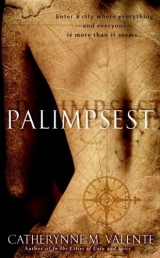
Текст книги "Palimpsest"
Автор книги: Catherynne M. Valente
Жанр:
Классическое фэнтези
сообщить о нарушении
Текущая страница: 8 (всего у книги 19 страниц)
Casimira’s gloves are the color of her hair—a size too small, so that her fingers cup delicately toward her palm. With her curled hands she guides November past the great splintered door, down a long hall lined with threadbare rugs, and into a tiny room, hardly big enough for both of them. They crouch together in the dark, knees touching, scalps against the ceiling. Casimira’s skin smells like the musk of a striped cat.
“I have brought you here specially,” she whispers. “This is Thulium House, the opera house, which you will not have heard of, I know. But it is the best thing I know.”
“How long have you lived here, that you know such places, that you have such a house as the one I saw, that you have a child?”
Casimira laughs, looks quizzically at her, and November has a curious moment of double vision, this quizzical woman and another, in a different dress spangled with silver stars, standing by a white river.
“I was born here,” she says. “I’m not at all like you. And he is not my child.”
“People are born here? How?” November asks, so new at this, the dullest child in class!
“In the usual way, I should imagine. Is there some exciting new method where you come from?”
“No . . . but if you’ve never been to my world, how did you know about the ring?”
“I listen. I have a billion ears, and they whisper to me of a trillion small things. They tell me all your little protocols—bees are particularly attracted to exotic systems of manners. Theyare my children—it would be more accurate to say I am the daughter of that boy holding on to my skirts! Perhaps if you are patient, I will show you the factory where my ears are made.”
“Casimira, what is this place? If your ears say so much, you must know.”
“I don’t understand the question, my dear. It is the world.”
“But it’s not. I go to sleep, I wake up here. I take nothing back with me. It may be real, for some values of real, but it is not the world. Ilive in the world. I know its shape and its smell.”
There is a small rapping at the door of their room, and Casimira shakes her head. “Later. It’s time.”
She holds up a long blindfold, and November recoils from it, untrusting.
“Nothing is going to hurt you, November. I promise. I will not allow it. I would never allow it.”
Unsure, her jaw tight and quivering, November accepts the fold. When the matriarch bends to her, she sees that the back of Casimira’s severe dress is entirely cut away, so that her smooth skin shows past her tailbone. Casimira tightens the ribbons at the back of November’s head, and guides the hands of her compatriot to return the favor. It is an oddly ritualistic thing. They breathe together, blinded.
“I have listened to so many of you move through the city,” Casimira says mildly. “The beetles know you, and also the ants. You crush them beneath your feet because you are ignorant. I feel their infinitesimal deaths in my smallest finger. I have seen so many proceed as you proceed now, your silly pilgrim’s progress through a place which is my home, which is no more strange to me than milk at breakfast. You are all so confused, so young. I feel as though I have heard your dullard’s questions so often my stomach is sick of them, though no one has ever gotten close enough to me to ask lip to ear, as you do. They ask it of the heavens, and the dark, and icons, and the stars, and beggars, and the moon. The spiders hear it all and laugh at them. It is unutterably boring, the multitudes in progression from innocence to inkling to knowledge to the inevitable apotheosis of desperation. It is wearisome in the extreme; it never varies. No one ever succeeds, they either give up or abandon themselves to nihilism or kill themselves. No one ever solves the equation, no one can ever steal more than a few scattered nights in Palimpsest. You are all so alike you might as well be family.”
A hushing, sliding sound interrupts politely, and a draft tells November that one of their walls had been drawn up like a curtain. The skin on her cheek pricks up in gooseflesh. Her pulse throbs.
The voice begins quietly, a low, cheerless note held terribly long. A tremor passes through her—she can feel the singer’s breath on her neck, the electric brush of lips at her ear. And the song goes on, the ballad, the aria, so close she knows each motion of the invisible mouth. A woman sings of a child with the head of a frog who fought in the war, who in the center of the battlefield sang dirges to all she killed with her small pistols. The child loved a boy with wolf’s hands, and to her song he always came, faithful, to dwell in the peculiar grace of those who have just escaped a great, black thing. But the generals heard her song, too, and came with their tall surgeons to cut out the child’s larynx, so that she could no longer give away their position to the enemy. She stood in the center of the battlefield and sang until she cried and her face was red with the effort of it, but she was silent, and without her song the boy with wolf’s hands was lost, caught searching for her behind the lines, and gleefully executed by the frog-girl’s fellow soldiers.
The song is complex and awful and so beautiful November’s stomach twists in fear that it might end. But end it will and end it does, and the singer’s tears have fallen into her ear. She puts up her hand in the dark, and it falls upon a wet face, as near to her as kissing, and then it is gone. The unseen soprano retreats; the wall slides back. Casimira takes her blindfold away; November takes hers.
“She will go to the next room, now, and the next, and the next,” Casimira sighs. “The opera is an austere and intimate thing, it cannot bear very much light. She will sing in a hundred ears before the night is done. She will sing of the war, and the miserable remnants of it, and of love in the days when Hieratica Street was an inferno.” Casimira puts her small hand on November’s sternum. “This isthe world,” she says sternly, “just the world,” she says, her eyes half-glowing in the shadows. “Terrible things happen here, to children, to the grown. We have a history the same as you do. When you are in your own home and ask where you have found yourself, what do you answer? You say to yourself: I am home, in such and such city, in such and such province, in a country, in the world.You are in Palimpsest. It is just a city. I am not a magical thing. I am not a beast or a sylph. I just live; we all just live. We eat and starve, we hoard and we fling open our stores. We fall from grace, we lose faith.” Casimira circles November’s waist with her gloved arms. “We become obsessed over things against good advice.”
“If all that is true, why must I wake up? Why must I sleep with strangers to get here at all?”
“Do you not have borders in your country? And guards? And passports and papers of identification?”
“Of course.”
Casimira smiles softly. Her teeth shine. She puts her hand on November’s ruined cheek.
“Of course you do. And so do we.”
From beneath her dress Casimira draws something that sings as it leaves her side. November can see, even in the murky shadows, a long knife, so pure and silver it is nearly white.
“This is the world, November. It’s a difficult thing for someone like you to remember, but I am a helpful woman if I am nothing else. I want to help you. I want you to come back. To promise me you will come back, that you will not make me wait again.”
“I’ll . . . I’ll try . . .” November’s eyes open wide in the dark, trying to see where the knife has gone. Her voice trembles.
“I am going to help you see the way of things. To see more quickly than the other lost, bumbling fools who plague my rats in this place. To see as clearly as my bees see. It will go easier for you. There will be no boring existential crises. When you come to my house again, things between us will have progressed very far.”
Casimira pulls her right glove off finger by finger and lays it around her neck like a stole. She grasps November’s wrist resolutely and spreads her fingers against the smooth cold floor, pushing her first two fingers together into a blessing. November almost falls with the force of the woman dragging her hand downward. But she catches herself: it is a dream and she will be all right, she is sure of it. Almost sure. She closes her eyes and calms her body, sinking into the other woman’s grip.
“I’ve kept a room for you,” Casimira whispers, so faintly November barely snatches it from the air before the patroness of Palimpsest swings the long knife down and severs two of her fingers in one long slice.
Three people cry out and fall to their knees, clutching their fingers in anguish—and then it is gone, and they shake their heads, and they walk on through the night, understanding nothing.
THREE
SIMPLE DECLARATIONS
Oleg swam up toward waking, unwilling, fighting the current of consciousness. Gabriel’s voice sliced through his sleep.
“There’s coffee. Drink it. Or don’t.”
The wadded up weight of Oleg’s jeans tossed casually at him brought him fully into the world. Gabriel frowned at him over the rim of a mug that proudly announced the indomitable strength of Denham Steel.
“Please leave as soon as possible, either way,” he said flatly.
“What’s wrong?”
Gabriel’s look turned withering and he tossed the remainder of an ugly, thick black brew into the sink. “Nothing. I don’t like company in the morning. Just, please go.”
Oleg dressed without hurry. Mila often watched him dress, out of a vague anthropological curiosity, and it felt much like that now, with Gabriel’s cold eyes on him. He buckled his jeans with a grimace. His hands smelled vaguely of condoms and lubricant, a smell he associated with things he probably shouldn’t have done. That seemed to be about where he was at.
This was stupid. They liked each other, they had been happy, he had seen it in Gabriel’s face afterward, sinking into sleep with his head on Oleg’s chest. They could have been less lonely in the presence of the other. What had he done?
Oleg collected his tools and stood with finality before the architect, whose eyes were red and slightly wild, shaken.
“Just a dream, right?” Gabriel said, like an accusation, like certainty of guilt.
Yes, just a dream, a dream they shared, a dream that made itself manifest on his stomach. Livid, like a bruise.He took a deep breath, a last effort. “Even if it were real, Gabriel, what’s the difference between punching a clock here and punching it there? Are you better off, serving elephant to rich people who won’t let you look them in the eye?”
Gabriel’s broken eyes welled up. “Oh, Oleg,” he said, “you don’t understand. Here, nothing means anything. It’s all just . . . random.Men and women and buildings and holidays and dinners and streets. It’s all flat. It’s like it’s missing a dimension, deeper than depth. The dimension of ritual. There, everything means something. Even dinner. Even a time clock.” He laughed, and then coughed harshly, as if hacking back a sob.
Gabriel collected himself. Dark circles bruised the skin under his eyes, and he was so thin, as if he hadn’t eaten in this world for days. “Get out,” he said quietly, picking at something invisible on the plastic counter. “Please just get out.”
_______
Oleg locked the door behind him, conscientious of the propriety of keys, and stepped into the snow.
_______
His apartment was empty.
Lyudmila was often out, on whatever business ghosts might have, and for this reason Oleg did not worry about it when she did not greet him or watch him pour tea or wet the table with her bare feet, except that he felt the errant and ugly need to cry, and had long passed the point where he could cry without her. She would come back. He buttered cold bread and boiled an egg. The back of his neck shivered; Gabriel had not seen the second half of Oleg’s dream, could not know it or guess it. How real she had been, how dry, how flesh.
Oleg understood the dead, or believed he did. He had been well brought up by them, well schooled. He knew their vespers and their matins. He walked in their city, rode their trains. He saw Manhattan for what it was because his sister had long ago taught him to recognize the signs, signs that rode on the moribund world like burn marks on an old lightbulb.
But dreams were not his to own as death was. He rarely remembered dreams, rarely cared for them. They were thin and small compared to her, compared to his city. He simply didn’t care. And the other city, Gabriel’s city—well, it didn’t matter. Lyudmila was there; Lyudmila was here. Why wouldn’t she be? Nothing else shone as brightly as her. What difference did it make if he fixed locks in a city of glass and stone or walked among mad bankers along a river of cream? At least he didn’t have to wait tables here. Lyudmila was a constant. The only constant. The backdrop didn’t matter. Gabriel couldn’t understand that, could never consider that it didn’t matter if the city was real or not.
But Lyudmila did not come back. Weeks passed, a month. She had never stayed away so long, even when he had fallen in love with a Polish girl from Brooklyn and ordered his sister, finally, away. It was time to let her go,he had thought. He wanted to marry this one. She wouldn’t understand a dead girl living with them. Mila hadn’t cried or yelled or broken anything. She had just slipped out a window. And stayed away for exactly seventeen days, each of which he had marked with a small cut on the inside of his calf.
She returned when he stopped eating and the Polish girl began a cozy acquaintance with his doctor.
“Why did you come back?” Oleg had asked.
“You needed bandaging,” Lyudmila had said, and buried her head in his shoulder.
The Polish girl had left him for a social worker who brought her orange blossoms every day until she forgot all about him. He hadn’t resented it. He had learned the lesson he needed and never sent Lyudmila away again.
But it had been twenty-seven days now, and he had begun to mark them as before, with a razor on the skin of his leg, not out of compulsion, but hoping to call her back through sympathetic magic. If he needed bandaging enough, she would come home. But she did not come. He thought of Gabriel occasionally, but his failure there seemed too big to move.
Oleg bent to his work. He had neglected them, his locks and his keys, in the madness of two such quick and strange lovers. These things happened. They forgave him. He removed the heavy front-door mechanism from a condemned hospital up the Hudson a ways and brought it back to the little bedroom that housed his collection. It shone with dull malevolence, the newcomer among the natives. He brought it a succession of keys to become devoted to, all of which it rejected with an upturned knob. He finally abandoned that. He listened as carefully as he could to each lock he repaired, for its secret cry, for the clicking and turning of its wishes. But most of all he listened for a small, cold voice calling him from further and further doors. He heard silence, and the distant Atlantic. Mila had never tormented him before; it was not her way.
Oleg began to leave the house in disarray. She would never scold him, but she had always been driven to comment upon it. The egg has gone cold, the tea is acrid. The plate is dusty. Simple declarations, without accusation or advice. Where could she have gone?
But he did know where she was, he supposed. He had seen her there, by a white river, wearing a blue dress. If she was not here she must be there—perhaps that was where she went when she could not bear any more of the living. Perhaps she fished a coat from the street and walked under palms with that strange snow in her hair. Perhaps she had a lover there.
And Oleg had been there, too, with his sister. He had held her cold hand on an iron bench. He had seen the curvature of her ear. He had been there, he had been there every night since, among the banks and drenched in the white river. And every night she looked up at him through snowy hair and shook her head in disappointment. She turned from him under dozens of moons and strode past the brick walls of the tunnel, and he could not follow her, somehow, could not pass into the places where she walked. Amber shadows gathered to block the way. It was like a puzzle, and he could not solve it. Could not follow.
But Oleg was not so dense that he did not surmise how the thing was done. He had held a lover’s body in his mouth twice, and twice he had slept into that place. But he did not know how to find anyone but the other Lyudmila with her liony long hair and wide mouth and thin, brittle Gabriel himself. There were others, there must be. A virus loves company. But he did not know how he could possibly find them. It had been an accident, like an unwanted child. He didn’t even know how to talk about it. He had practiced not talking about the things he knew until no man could be called his equal. Manhattan, Lyudmila, the furtive longings of locks and the shrill keening of their destined keys. It calmed him to collect the things he knew and did not speak of. A city on the other side of sleep. That had to be added to the tally, now. Behind the gate of horn—it was horn, right? He remembered that from a long-ago book his mother had loved. Virgil, he thought. A book about long journeys and the sea. The gates of sleep are two, a gate of ivory and a gate of horn. He had been horrified as a child, picturing a great door of tangled antlers and tusks.
Surely that was the gate of Palimpsest.
He swallowed the name of the city. It was hard in his throat, like a piece of candy lodged in the wet pinkness there. It was difficult, absurd, to say the word here, in his apartment, under all those other apartments with their individual lives wheeling inside. Hard to say how he knew it, just as he could not remember a time when he did not know that this place was New York, Manhattan. It just was. It just existed. It was just called that. But what the Holland Tunnel or the George Washington Bridge of Palimpsest was, he could not say. It had always seemed significant to him, whether one entered the city by bridge or tunnel. Ascending or descending, down to the underworld of violet shadows and civilized bowls of blood or up through the fog and into streets of silver and sheen.
But that place, that other city, Gabriel’s city, it was not clearly marked. Inconsiderate. Which way was intended? He was mired to the knees in the river muck, looking up at the lights.
_______
The easiest way,Oleg thought, sitting at a public computer terminal in the great be-lioned library. Green study lamps bulged at every desk like guardian turtles. He should have thought of it before. People naturally form networks, spangled, spidery hoops of light lying over the world. People wanted to be found.
He logged in to the three or four social sites where he maintained mostly inactive accounts, as well as a handful of classified listings and held his breath while he typed into the empty, inviting, assuring text box:
Seeking travelers to the borough of Palimpsest. Unexplained spontaneous tattoos? Bad dreams? Find me. Please, find me.
There,Oleg thought. Obscure enough—no one would contact him who did not know what he meant, but plain enough to those who couldn’t ignore the black mark on their skin. Some flair. He posted it to all his accounts and classifieds and walked to the corner restaurant for half a Greek chicken, which he devoured. He chewed at the bones for a while.
If Mila were here,Oleg thought, she’d have helped me write it. It wouldn’t sound quite so much like an advertisement for skin cream. If she had been here, the chicken would have tasted sweeter.He would not have chewed the bones—it’s not a nice habit. But he would find her soon, and she would tell him to clean the apartment in a very stern tone.
When he returned to his terminal and turtle lamp a few hours later, Oleg found a long series of e-mails in his in-box, all the same. He stared.
This post has been deleted by an administrator.
This post has been deleted by an administrator.
This post has been deleted by an administrator.
This post has been deleted by an administrator.
This post has been deleted by an administrator.
This post has been deleted by an administrator.
This post has been deleted by an administrator.
This post has been deleted by an administrator.
At the bottom of each notice, someone had typed, in a tiny font:
Sorry, brother.
Oleg sat back in his squeaky leather chair, his eyes full of frustrated, angry tears.
_______
It is not easy to go without clothing in December. Not in New York. Not through brief, fitful snow blowing down streets like old dreams. The cold was so much keener than he imagined it would be. It tore at him with small cat-teeth, and the blood sped away from his skin, inward, away from the wind. But he was staunch, steadfast. A little tin soldier. Every morning Oleg took off his shirt and walked through the square through which half the world walked. Every night he would sit in a steaming bath until it turned as cold as his shoulders.
By each day’s toll of ten in the morning, his chest had already gone clam-white. On his stomach the black mark screamed its dark lines, seething against that frozen flesh. He was ridiculous, terrible in such a throng. He had chosen the most obvious place. Times Square, where the raucous lights were brightest and all the tourists were certain to come, sooner or later. Sooner or later. It was the most dead of all the places the dead loved on this monochrome island, its putrescence beautifully bright against the long gray cadaver, like mushrooms and moths. Everything here had halos. It made him want to die, too, just to stand here, with snow and light on his eyelashes, with the gray daytime sky laughing at all that neon and strobe, all those things whose proper province is the night.
He was preposterous here, obscene. But it was all he could manage. It was all he knew how to do, now, to lay himself at the mercy of his sister, of chance. Whoever the offended administrator was, he was against Oleg, clearly, and cleverer. What could he do but walk through the city, walk among the living who stamped upon the streets of the dead, and let his flesh plead silently for him, to all who watched—administrators, ghosts. An advertisement amid all the advertisements of Times Square, screaming as loudly, flashing as brightly: I’m here, take me, I am willing to go.He was good at this. He knew how to walk straight ahead and allow some wraith he could not now see to come to him. He had never sought a thing out in all his days if it was not a key or a lock. That sort of thing was for other men, other temperaments. Mila had crouched upon hisbed, he had called her by no fell rite, sprinkled no blood in a circle, bought nothing at great price.
Yet Oleg walked through the snow, and the wind chapped his skin, and the pain was a wrangling, thorough thing.
“I miss you, Mila. I’m coming as fast as I can,” he whispered, and a woman with her hands stuffed deep in brown pockets flinched away from him: a mad, half-naked thing whispering to himself. Oleg did not look at her. He was proving himself worthy. This was how it was done: you bare your belly to a great beast and endure trials and it all works itself out. There is a treasure or a sword. Or a woman. And that thing is yours not because you defeated anything, or because your flesh was hard and unyielding, but because you were worthy of it, worthy all along. The trials and the beast were just a way of telling the world you wanted it, and the world asking in her hard way, hard as bones and hollow mountains, if you really and truly did.
And Oleg did. And he watched the people around him, how their gazes flickered to his stained stomach, to the jack-knifing streets there, and back to his eyes, how full of fear they were, how close many of them came to calling the police. But he walked on. He was worthy, a worthy knight, and he would enter the city by low ways. Sooner or later, someone would see him who hid matching cartography under the pad of their foot or beneath their hair, and they would fall together as he and Gabriel had, as he and Lyudmila had, and the world would nod sagely.
Oleg practiced this flagellation for fifteen days.
He had imagined a warm hand pressing against his back a thousand times before it occurred, imagined it so often and so fiercely he hardly felt it when it did happen. Such a small hand, and he was so cold. He looked down at her, a woman with short brown hair whipping around her face like a storm. She was androgynous, unnoticeable, small, her eyes angled upward slightly, a silver fur ruff framing her high cheeks, blistered red by the wind.
“You don’t have to do this,” she said, her eyes searching him earnestly, with a kindness like saints kissing. She bent her head before him and smoothed over her hair: on the back of her neck, it was there, black, bright, prickled with gooseflesh.
“I’m here,” she said. “I came.”
Oleg’s knees buckled and he dropped to his knees. The tears came faster than he wanted them to, unstopped and messy, chasing breath he could not catch, hitching, heaving gulps of the winter air as he pressed his spinning head into her within a crush of people so great it became a wall and they were alone.
“I watched you,” she said. “I’ve watched for ten days now, until evening, from that window just there. That’s my office. I wanted to know how long you’d do it. I drank about a thousand cups of tea. I ran out of sugar. You just kept coming back and I just couldn’t interrupt you, it was so beautiful, so awful. I saw your lips split open. I saw the sore on your temple grow.” She put her hand in his hair. “It was like watching someone be born. You were an angel, a real one, with a terrible name, like in the Bible. No feathers or light, just hardness and falling into the dark. My hands shook on my teacups for ten days. I didn’t dare interrupt. But I decided I wanted you, after all. I wanted to stop it for you, to stop the wind and the snow and hold my arms over your head. So I’m here, I came. My name is Hester and I came for you.”
Oleg clawed his way up her height as though she were a craggy hill and his kiss was like biting into her warmth. Under his teeth the blood of her lip welled up, a hot red thing between their mouths.
“I’m here,” he choked, “take me, I’m willing to go. Anywhere. Away. Please.”
And Hester took him like a beggar onto the train, which he would not remember, far to the north end of the island, and into an apartment he barely saw through the film of his cold and his grief and his need. He was so hungry for her he thought for a moment his body would simply leap out of itself and into her, a second body, compressed and crimson and screaming within the freezing shell of his elbows and knees. He kissed her neck where it was black as frostbite, bit it, shut his eyes against her and grabbed at her hips, just to pull her closer than anatomy allows, just to swallow her warmth, her sweet breath like milky tea.
“Wait,” she gasped, her shirt already wrinkled up over her belly, her jeans unbuttoned. “It’s been so long . . . just wait.” She put her palm against her cheek, her eyes wild, glistening. “It’s been so long since I did this.”
“What? I thought you’d be . . . I don’t know. Old hat. A veteran.”
“I didn’t want it,” Hester snapped, slumping onto her threadbare brown couch. “I don’t.I said no—remember that word? I turned away from it. All of it.” She pulled out a drawer on a small blue table; it was filled with dusky orange bottles the color of dead suns, bottles not unlike his own at home. “I have six prescriptions to make sure I sleep black and deep. Dreamless. Get it? I didn’t want it. I didn’t want to see that place, ever again. I grew my hair just long enough to cover the mark and I ate pills till the city went away. It’s been years. I stopped. It ispossible to stop. Until a ghastly, frozen angel comes walking down the street and you think: No more. He’s not my responsibility. Someone else take this one, someone else come with a long coat and wrap him up, someone else kiss him until he’s warm again! Why won’t they come? Why won’t they come?But they don’t come. No one else is coming, and he’s freezing and so beautiful you think the wind might take him just to ease its loneliness. And you’re lonely, too. And you tell yourself he’s worthy, if anyone ever was.”
Hester was up on her knees on the couch cushions, bent over the torn arm of the sofa, her nails digging into the upholstery, staring at the floor, her voice thick and ragged. Oleg stroked her arm timidly, not knowing how to help her, until she grabbed his hand and dug her nails into it instead. She tilted her face to be kissed again, such a terribly deliberate act, slow and resigned, that he simply slumped into her, awkwardly, falling together in a heap onto the couch, their tongues hard and hostile. Her breasts were small and cold beneath her shirt; she did not stop him when he pushed her jeans down, or when he turned her around so that she held the edges of the unraveled upholstery to keep herself kneeling as he moved her knees apart and pushed into her, still frozen and shaking. It was not easy—she was dry and unyielding, her teeth clenched, her breath sucking thin and sharp at the air. That she did not stop him was all she seemed to be able to contribute, and the pills rattled in her drawer as he buried his face into her neck. His body leapt out of itself; she held his arm around her waist.
“I don’t want to go back,” she whispered helplessly.
Coriander and Ultramarine
A GROVE OF BAMBOO SPRINGSup near the southern barrens of Palimpsest, just before the city slides away into desolate desert. It is very green and very tall, so tall that the fibrous crowns get lost in the deep blue clouds. Between the willow-bright trunks grow scarlet tulips, each as sedately filled with rainwater as a cup with tea at the finest of houses. The stalks stand like a portcullis against the desert, and no man may say where they end. Certainly not I. Certainly not you. But we may come here and look out on the waste, for it is a singular pleasure to be warm and safe while one watches horrors unfold, is it not?








